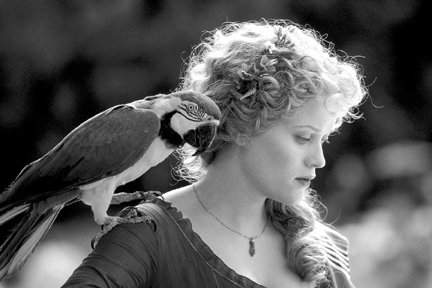 Reese Witherspoon entertains a distinguished guest from India in ‘Vanity Fair.’
Reese Witherspoon entertains a distinguished guest from India in ‘Vanity Fair.’
|
| Vanity Fair\r\nStarring Reese Witherspoon, Romola Garai, and James Purefoy. Directed by Mira Nair. Written by Matthew Faulk, Mark Skeet, and Julian Fellowes, based on William Makepeace Thackeray’s novel. Rated PG-13. |
|
A D V E R T I S E M E N T
|
|
|
|
A D V E R T I S E M E N T
|
|
Mira! Mira!
A Sharp bad girl gets everything in the unromantic period piece Vanity Fair.
By KRISTIAN LIN
William Makepeace Thackeray wrote Vanity Fair in 1847, subtitling it “A Novel Without a Hero.” It ranks among literature’s classics because of his cutting satire on 19th-century England and its denizens: social climbers spending money they don’t have, titled lords and ladies living in poverty, and middle-class folks grubbing after those titles. His world is driven by the kinds of venality, hypocrisy, materialism, and greed that are quite recognizable to us modern readers. Taking a cue from John Bunyan’s religious novel The Pilgrim’s Progress, he called that world Vanity Fair.
It’s fitting that an Indian director now brings Thackeray’s magnum opus to the screen, since the author was born in Calcutta and his novel is full of characters with ties to India. Mira Nair is a filmmaker who’s quite comfortable with sprawling canvases full of characters, such as her last movie, Monsoon Wedding. She gives the book’s Eastern elements their due and even interjects an Indian dance number that briefly turns the movie into pure Bollywood. In adapting Thackeray, she’s bitten off somewhat more than she can chew, but it’s hard to imagine who could boil down such a huge book without losing a lot. The movie’s flaws are considerable, but so are its accomplishments.
After a brief prologue, the movie picks up in the early 1810s at an English girls’ boarding school, as two of its prize pupils leave. Amelia Sedley (Romola Garai) is a virtuous, self-sacrificing girl. Her best friend, Rebecca Sharp (Reese Witherspoon), is a shamelessly manipulative con artist. Out in the world, Becky and Amelia move through various levels of society, getting married, having children, and seeing fortunes made and lost. Victorian novels made heavy use of the good girl/bad girl dichotomy, but Thackeray bucked convention by sympathizing so openly with the bad one. His Vanity Fair is such a shallow and petty place that Becky’s much better equipped to deal with it.
The movie goes wrong in sanding down its antiheroine’s harder edges. Here she genuinely loves her gullible, gambling-addicted army officer husband (a properly dashing James Purefoy), and she’s simply trying to make her way in a society in which women are property or social guardians who moralistically exclude people they don’t like. Witherspoon does her best to emphasize Becky’s unattractive aspects. This actress has wasted too much time trying to fit the America’s Sweetheart mold, and here she reminds us that her real talent is for playing connivers. She’s particularly good at grasping how Becky handles intricate social situations; she’s subtle and yet piquant when Amelia’s fiancé George Osborne (Jonathan Rhys-Meyers) tries to put Becky in her place, and she answers his condescension with some of her own.
Still, the movie’s softening of the character robs the satire of much of its punch. Amelia’s plotline gets truncated as well, especially near the end when subplots are unceremoniously resolved and characters re-appear or die with no preface. The book is as much a critique of Amelia’s eagerness to suffer and be the victim as it is of Becky’s conscienceless opportunism. The movie loses that, and thus wastes some good work by the softly winsome Garai and especially by Rhys Ifans as Dobbin, the loyal officer who loves Amelia from afar. The latter performer, known better for playing scruffy comic weirdos, underplays this polished romantic part beautifully.
The rest of this large, predominantly British cast is equal to him, and they’re better served by the filmmakers’ nuanced approach to the supporting characters. George is a brave soldier who honorably insists on marrying Amelia after her family loses its money. Yet when his father (Jim Broadbent) orders him to marry a Jamaican heiress instead (Kathryn Drysdale), George treats that attractive, rich, educated young woman like she’s covered in slime, and — without explicitly telling us — the movie lets us know it’s because she’s a mulatto. Rhys-Meyers’ vaguely reptilian good looks give him an impressive sneer, and he’s in fine form playing a vain, snobbish bastard. Similarly, when George is killed at Waterloo, we feel Mr. Osborne’s grief at losing his son while also seeing that he’s willing to let Amelia starve rather than acknowledge her as George’s wife. The great Eileen Atkins does a marvelously entertaining turn as a society matron who sees through everybody except Becky, and Gabriel Byrne does a cruel one as a seedy operator who browbeats his wife and daughters-in-law into accepting Becky into their house.
The machinations of these characters are captured well by the writers, and Nair makes the process of mapping out the world of Vanity Fair a fascinating one. That’s one reason why the film wears its 137-minute running time so lightly, despite its structural flaws. It’s a good-looking piece of work, too. And there’s a nice bit near the end, as Becky sees the empty charade her life has become and is about to lose her composure when she suddenly spots a guy who’s an easy mark. The glint comes back into her eye, and she’s soon working her charms on him so she can get his money. That’s the Becky Sharp we know and love or at least love to hate.
 Email this Article...
Email this Article...

